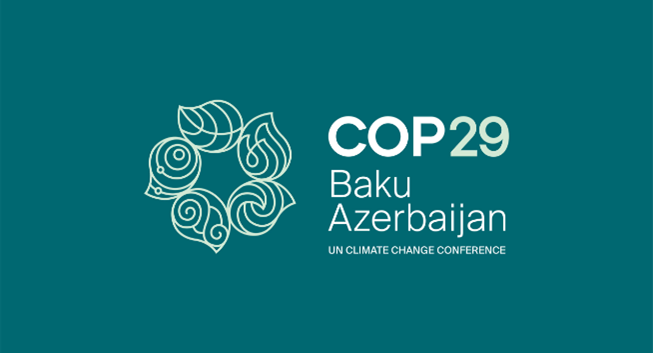
Within the framework of the 29th session of the Parties to the United Nations Framework Convention on Climate Change (hereinafter - COP29, the Conference) in Baku, Republic of Azerbaijan, on 16 November 2024, the Digitalization Day was held for the first time for the Conference programme at the initiative of the presiding party - the Republic of Azerbaijan.
The thematic events of the Digitalization Day aimed to foster discussion on the indispensable role of digital technologies in the fight against the climate crisis.
The opening event of the Digitalization Day was a high-level Green Digital Action roundtable organized by the Ministry of Digital Development and Transport of the Republic of Azerbaijan, the COP29 Presidency and the International Telecommunication Union (ITU).
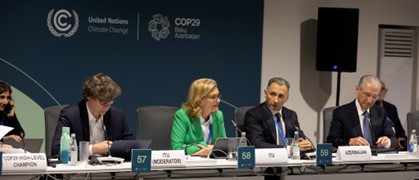
Rashad Nabi oglu Nabiyev, Minister of Digital Development and Transport of the Republic of Azerbaijan, who opened the event with an introductory speech, drew attention to the importance of digital technologies for the climate agenda and related issues: “These technologies are an important driving force towards achieving the UN 2030 Agenda for Sustainable Development, especially in areas such as climate monitoring, early warning systems and building resilience to climate challenges.”
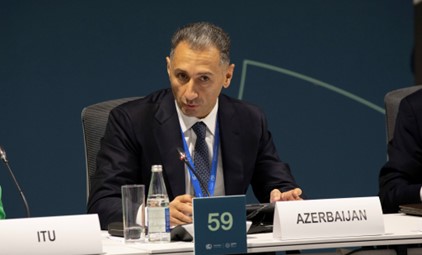
The roundtable was moderated by ITU Deputy Secretary General Tomas Lamanauskas. More than fifty speakers - ministers and deputy ministers responsible for digitalization, senior officials from international organizations, representatives of the private sector and civil society - took part in the discussions.
In addition to the Minister of Digital Development and Transport of the Republic of Azerbaijan, the representatives of the Regional Commonwealth in the field of communications who spoke at the roundtable were:
- Sherzod Shermatov, Minister of Digital Development of the Republic of Uzbekistan, Chairman of the RCC Board of the Communications Administrations Heads - RCC participants
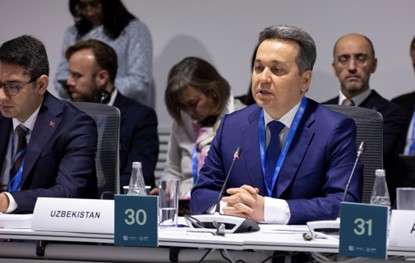
- Kanysh Tuleushin, First Vice-Minister of the Ministry of Digital Development, Innovation and Aerospace Industry of the Republic of Kazakhstan
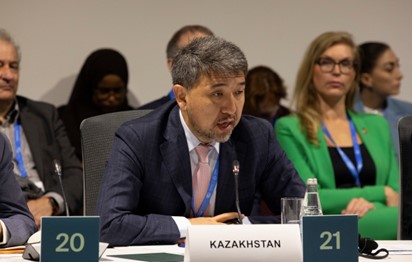
- Alexey Borodin, RCC Director General
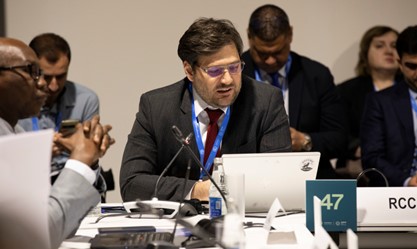
The discussions were also attended by decision makers in the field of green digital agenda representatives of government agencies from Brazil, China, Egypt, Estonia, Japan, Lithuania, Qatar, Pakistan, Romania, Somalia, Turkey and others, as well as representatives of such organizations and companies as UNCTAD, UNEP, ISO, WIPO, World Bank, IAEA, UNIDO, UNESCO, UNDP, UNECE, UNESCAP, CTU, BEREC, IEEE, GGGI, GIZ, Nethope, GeSI, OpenUK, Cisco, Google, Huawei, Nokia, SAP, FTTH Council Europe, Orange, ServiceNow, Alibaba, ZTE and others.
In the speeches of the participants of the round table, topics such as the integration of digital innovations into climate strategies, improving climate monitoring and adaptation of measures taken using digital tools, increasing energy consumption with the development of computer capacities for the introduction of new technologies, including Artificial intelligence and the metaverse, and the corresponding need to develop carbon neutral energy for all, eliminate the environmental impact of digitalization, demonstrate successful sustainable development initiatives and create opportunities for future cooperation to align digital transformation with global climate goals.
The results of the roundtable led to the adoption of the final document - Declaration on Green Digital Action (hereinafter - the Declaration).
Parties to the Declaration reaffirmed 8 common goals: using digital technologies and tools for climate action, building sustainable digital infrastructure, reducing the impact of digitalization on climate, promoting digital inclusion and literacy, information-based decision-making, promoting sustainable innovation and sustainable consumer practices, and facilitating the exchange of best practices.

In total, the Declaration has received endorsements from more than 1,000 governments, companies, civil society organizations, international and regional organizations and other stakeholders.
The Declaration should serve as a framework for cooperation to enhance action on climate change and sustainable development, taking into account the need to mitigate the negative impacts of rapid digitalization on the environment.















